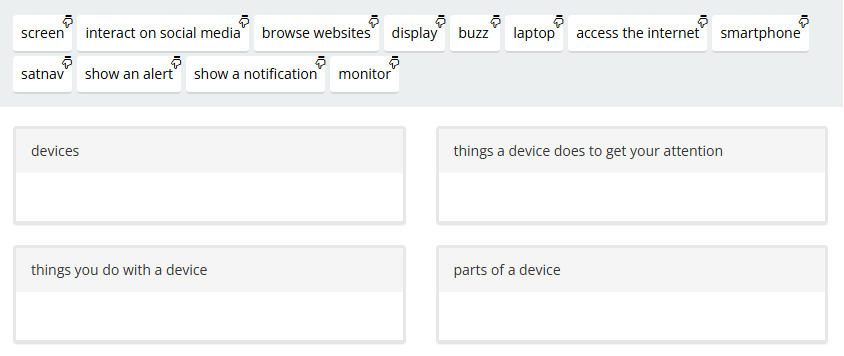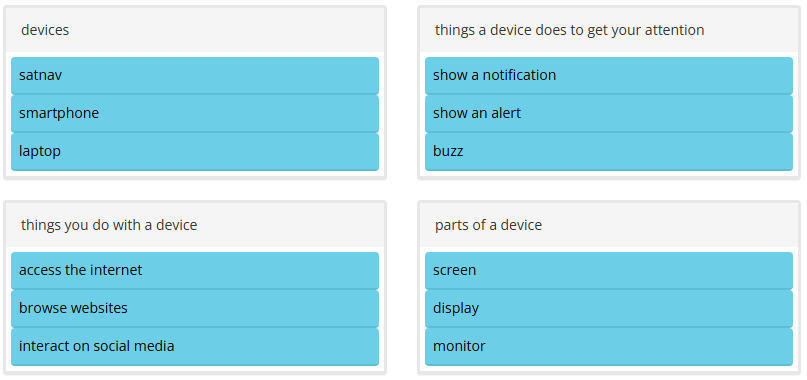【B2-Listening】03 A digital detox podcast-数字排毒播客

Listen to the podcast about doing a digital detox to practise and improve your listening skills.收听有关进行数字排毒的播客,以练习和提高您的听力技巧。
Do the preparation task first. Then listen to the audio and do the exercises.先做好准备工作。然后听音频并做练习。
A design presentation – preparation
Match the words with the definitions.
- Question
screen
interact on social media
browse websites
display
buzz
laptop
access the internet
smartphone
satnav
show an alert
show a notification
monitor
devices
things a device does to get your attention
things you do with a device
parts of a device

- Answer
Screen
- 屏幕 (píng mù)
Interact on social media
- 在社交媒体上互动 (zài shè jiāo méi tǐ shàng hù dòng)
Browse websites
- 浏览网站 (liú lǎn wǎng zhàn)
Display
- 显示 (xiǎn shì)
Buzz
- 振动 (zhèn dòng)
Laptop
- 笔记本电脑 (bǐ jì běn diàn nǎo)
Access the internet
- 访问互联网 (fǎng wèn hù lián wǎng)
Smartphone
- 智能手机 (zhì néng shǒu jī)
Satnav
- 卫星导航 (wèi xīng dǎo háng)
Show an alert
- 显示警报 (xiǎn shì jǐng bào)
Show a notification
- 显示通知 (xiǎn shì tōng zhī)
Monitor
- 监控 (jiān kòng) / 显示器 (xiǎn shì qì) (for a physical monitor)

Transcript
English
Presenter: So, we’re back in the studio. Welcome back, everyone. My name’s Rick Walker. From our laptops to our televisions, from the displays on our smartphones to those on our satnavs, we are in front of screens all the time. Have you ever wondered what it would be like to disconnect completely? To choose not to have access to the internet? If you have, you may be in need of a digital detox – a total switch-off from all things digital. The idea of people taking a digital detox is becoming more and more popular, especially amongst young people – and today we’re joined by someone who’s tried a number of digital detox activities and is here to give us some advice about it. Amanda Vince, welcome to the studio.
Amanda: Thank you very much.
Presenter: So, Amanda, you work for a fashion magazine in London, right? I guess your work means you need to be online a lot.
Amanda: Oh, yes. Apart from the hundreds of emails I get every day, I’m always browsing fashion websites, as well as online videos. I also need to be very active online, especially on Twitter and Instagram – sharing what we’re doing in the magazine, interacting with designers, photographers, influencers … it never stops, literally. Then of course there’s my friends and family to keep in touch with online too, and for me, my work grew out of my passion, so friends and work colleagues aren’t two totally separate groups of people and it all gets a bit messy online sometimes. I think I’m online for at least 12 hours a day.
Presenter: So, how did you get the idea for a digital detox?
Amanda: I read a book about it, called Log Off: How to Stay Connected after Disconnecting. The author’s name is Blake Snow. That book gave me some really good advice and made me think about trying to change some of my digital habits. I started with removing distraction.
Presenter: What do you mean by that?
Amanda: That means turning off alerts, buzzes, alarms or notifications of any kind. I had notifications set up for everything, and it meant I was always being forced to look at my phone. Removing all of them except for important contacts helped me focus immediately. The book also made a really good point, that we should ask ourselves ‘Why?’ every time we take out our phone. I realised that most of the times I looked at my phone were because I was trying to avoid or ignore something else happening right in front of me. It was an automatic habit.
Presenter: I have to confess, that happens to me too. But what else are you going to do when you’re standing in line at the bank or waiting for your train?
Amanda: OK, yes, I’m the first to admit that it’s great for helping time go by. But speaking personally, I found I wasn’t just checking my phone to kill time when I was alone. I was also doing it with friends or family around.
Presenter: Hmmm … right. Well, so far, this doesn’t sound too drastic. Turning off notifications and becoming aware of when we use our devices. That sounds easy.
Amanda: Yes, it’s the first step. Once we begin to realise just how much of a grip our devices have on us, then we’re ready to really take the next step. First, my partner and I did a weekend with absolutely no screens. She found it easier than I did. For me, it was a little bit scary at first but it turned out to be a pretty rewarding experience.
Presenter: A whole weekend, huh? I don’t know if I could …
Amanda: I think everyone has to do this at their own pace. If a weekend feels too much, maybe just try for an evening. Then work your way up to more. I guarantee, once you’ve tried it, you’ll want to try it again. We’re going to try for a whole week in the summer.
Presenter: OK, let’s pause there then and see what our listeners have to say. You can call us here directly, or send us a message on any of our social media channels … oops, should I be saying that? Anyway, more after the break.
English-Chinese
Presenter: So, we’re back in the studio. Welcome back, everyone. My name’s Rick Walker. From our laptops to our televisions, from the displays on our smartphones to those on our satnavs, we are in front of screens all the time. Have you ever wondered what it would be like to disconnect completely? To choose not to have access to the internet? If you have, you may be in need of a digital detox – a total switch-off from all things digital. The idea of people taking a digital detox is becoming more and more popular, especially amongst young people – and today we’re joined by someone who’s tried a number of digital detox activities and is here to give us some advice about it. Amanda Vince, welcome to the studio.
主持人:所以,我们回到了演播室。欢迎回来,大家。我叫里克·沃克。从笔记本电脑到电视,从智能手机上的显示屏到卫星导航上的显示屏,我们无时无刻不在屏幕前。您是否想过完全断开连接会是什么样子?选择不访问互联网?如果有的话,您可能需要进行数字戒毒——彻底远离所有数字事物。人们进行数字排毒的想法变得越来越流行,尤其是在年轻人中,今天我们邀请了一位尝试过多种数字排毒活动的人来为我们提供一些建议。阿曼达·文斯,欢迎来到工作室。Amanda: Thank you very much.
阿曼达:非常感谢。Presenter: So, Amanda, you work for a fashion magazine in London, right? I guess your work means you need to be online a lot.
主持人:阿曼达,您在伦敦的一家时尚杂志工作,对吧?我想你的工作意味着你需要经常上网。Amanda: Oh, yes. Apart from the hundreds of emails I get every day, I’m always browsing fashion websites, as well as online videos. I also need to be very active online, especially on Twitter and Instagram – sharing what we’re doing in the magazine, interacting with designers, photographers, influencers … it never stops, literally. Then of course there’s my friends and family to keep in touch with online too, and for me, my work grew out of my passion, so friends and work colleagues aren’t two totally separate groups of people and it all gets a bit messy online sometimes. I think I’m online for at least 12 hours a day.
阿曼达:哦,是的。除了每天收到数百封电子邮件之外,我还经常浏览时尚网站以及在线视频。我还需要在网上非常活跃,尤其是在 Twitter 和 Instagram 上 – 分享我们在杂志上所做的事情,与设计师、摄影师、影响者互动……从字面上看,它永远不会停止。当然,我的朋友和家人也可以在网上保持联系,对我来说,我的工作源于我的热情,所以朋友和同事并不是两个完全独立的群体,网上的一切都变得有点混乱有时。我想我每天至少上网12个小时。Presenter: So, how did you get the idea for a digital detox?
主持人:那么,您是如何想到数字戒毒的呢?Amanda: I read a book about it, called Log Off: How to Stay Connected after Disconnecting. The author’s name is Blake Snow. That book gave me some really good advice and made me think about trying to change some of my digital habits. I started with removing distraction.
阿曼达:我读过一本关于此问题的书,名为“注销:如何在断开连接后保持连接”。作者的名字叫布莱克·斯诺。那本书给了我一些非常好的建议,并让我考虑尝试改变我的一些数字习惯。我从消除干扰开始。Presenter: What do you mean by that?
主持人:您这是什么意思?Amanda: That means turning off alerts, buzzes, alarms or notifications of any kind. I had notifications set up for everything, and it meant I was always being forced to look at my phone. Removing all of them except for important contacts helped me focus immediately. The book also made a really good point, that we should ask ourselves ‘Why?’ every time we take out our phone. I realised that most of the times I looked at my phone were because I was trying to avoid or ignore something else happening right in front of me. It was an automatic habit.
阿曼达:这意味着关闭任何类型的警报、嗡嗡声、警报或通知。我为所有事情都设置了通知,这意味着我总是被迫看手机。除了重要的联系人之外,删除所有这些信息可以帮助我立即集中注意力。这本书还提出了一个非常好的观点,那就是我们应该问自己“为什么?”每次我们拿出手机。我意识到,大多数时候我看手机是因为我试图避免或忽略眼前发生的其他事情。这是一种自动的习惯。Presenter: I have to confess, that happens to me too. But what else are you going to do when you’re standing in line at the bank or waiting for your train?
主持人:我必须承认,这种情况也发生在我身上。但是,当您在银行排队或等火车时,您还能做什么呢?Amanda: OK, yes, I’m the first to admit that it’s great for helping time go by. But speaking personally, I found I wasn’t just checking my phone to kill time when I was alone. I was also doing it with friends or family around.
阿曼达:好吧,是的,我是第一个承认这对于打发时间很有帮助的人。但就我个人而言,我发现当我独处时,我不只是为了消磨时间而看手机。 我也和周围的朋友或家人一起做。Presenter: Hmmm … right. Well, so far, this doesn’t sound too drastic. Turning off notifications and becoming aware of when we use our devices. That sounds easy.
主持人:嗯……对。嗯,到目前为止,这听起来还不算太激烈。关闭通知并了解我们何时使用设备。听起来很容易。Amanda: Yes, it’s the first step. Once we begin to realise just how much of a grip our devices have on us, then we’re ready to really take the next step. First, my partner and I did a weekend with absolutely no screens. She found it easier than I did. For me, it was a little bit scary at first but it turned out to be a pretty rewarding experience.
阿曼达:是的,这是第一步。一旦我们开始意识到我们的设备对我们有多大的影响力,我们就准备好真正采取下一步了。首先,我和我的搭档度过了一个完全没有屏幕的周末。她发现这比我容易。对我来说,一开始有点害怕,但事实证明这是一次非常有益的经历。Presenter: A whole weekend, huh? I don’t know if I could …
主持人:整个周末,是吧?我不知道我是否可以…Amanda: I think everyone has to do this at their own pace. If a weekend feels too much, maybe just try for an evening. Then work your way up to more. I guarantee, once you’ve tried it, you’ll want to try it again. We’re going to try for a whole week in the summer.
阿曼达:我认为每个人都必须按照自己的节奏来做这件事。如果周末感觉太累了,也许可以尝试一个晚上。然后努力争取更多。我保证,一旦您尝试过,您就会想再试一次。我们将在夏天尝试整整一周。Presenter: OK, let’s pause there then and see what our listeners have to say. You can call us here directly, or send us a message on any of our social media channels … oops, should I be saying that? Anyway, more after the break.
主持人:好的,让我们暂停一下,看看我们的听众有什么要说的。您可以直接给我们打电话,或者在我们的任何社交媒体渠道上向我们发送消息……哎呀,我应该这么说吗?无论如何,休息后还有更多。
Task1
A design presentation – 1
Are the sentences true or false?
- Question
- The radio host says that a digital detox …
a. means we are in front of screens all the time.
b. is something younger people are trying more.
c. is important for our health.- Which sentence is not true about Amanda Vince’s job?
a. She is online a lot of the time.
b. She follows fashion on social media.
c. She uploads her own videos to social media.- What is the name of the book that influenced Amanda?
a. Log Off: How to Stay Connected after Disconnecting
b. Log Off: How to Disconnect and Stay Disconnected
c. Log Off: Advice for the Digital Detox- The first step in a digital detox is to get rid of distractions, such as …
a. noises the phone makes.
b. screens in your home and workplace.
c. the bright colours on your phone.- Amanda removed notifications from …
a. her close family and friends.
b. everything except important people in her life.
c. everything except very important work-related things.- The book also suggested that …
a. we replace digital distractions with real-world ones.
b. we think about the reason we are looking at our phones so much.
c. we try to be more polite with our phones around people.- Amanda and her partner …
a. tried a two-day digital detox first.
b. found it impossible to completely disconnect.
c. found it very easy to do a digital detox for a weekend.- Amanda believes that a digital detox …
a. is not a good idea if you have a lot of work.
b. is better if it’s for a week, not just a weekend.
c. is something everyone will enjoy.
- Answer
Choose the correct answer.
- The radio host says that a digital detox …
a. means we are in front of screens all the time.
✔b. is something younger people are trying more.
c. is important for our health.- Which sentence is not true about Amanda Vince’s job?
a. She is online a lot of the time.
b. She follows fashion on social media.
✔c. She uploads her own videos to social media.- What is the name of the book that influenced Amanda?
✔a. Log Off: How to Stay Connected after Disconnecting
b. Log Off: How to Disconnect and Stay Disconnected
c. Log Off: Advice for the Digital Detox- The first step in a digital detox is to get rid of distractions, such as …
✔a. noises the phone makes.
b. screens in your home and workplace.
c. the bright colours on your phone.- Amanda removed notifications from …
a. her close family and friends.
✔b. everything except important people in her life.
c. everything except very important work-related things.- The book also suggested that …
a. we replace digital distractions with real-world ones.
✔b. we think about the reason we are looking at our phones so much.
c. we try to be more polite with our phones around people.- Amanda and her partner …
✔a. tried a two-day digital detox first.
b. found it impossible to completely disconnect.
c. found it very easy to do a digital detox for a weekend.- Amanda believes that a digital detox …
a. is not a good idea if you have a lot of work.
b. is better if it’s for a week, not just a weekend.
✔c. is something everyone will enjoy.
Task2
A design presentation – 2
Match the useful phrases with the tips.
- Question
Verbs
- to solve
- to come up with
- to meet
- to speak for
- to secure
- to expand
Nouns
a. funding
b. a need
c. a problem
d. itself
e. the range of services
f. an idea
- Answer
- Have you ever wondered what it would be like?
- What do you mean by that?
- I have to confess, that happens to me too.
- I’m the first to admit that.
- This doesn’t sound too drastic.
- You’re ready to take the next step.
…… to solve a problem
- 解决一个问题
…… to come up with an idea
- 想出一个主意
…… to meet a need
- 满足需求
…… to speak for itself
- 不言自明
…… to secure funding
- 获得资金
…… to expand the range of services
- 扩大服务范围

Discussion
What’s your favourite app for learning and why?
您最喜欢的学习应用程序是什么?为什么?Would you like to do a digital detox?您想做数字排毒吗?
Vocabulary
shower
- 简易
英/ˈʃaʊə(r)/美/ˈʃaʊər/
n.淋浴器,花洒;淋浴间,淋浴室;淋浴,洗澡;阵雨,阵雪;(落下的东西)一大批,一阵; 流星雨;<美>(为即将结婚或分娩的女子举行的)送礼聚会;<英,非正式> 一群乌合之众,一群笨蛋v.淋浴,洗澡;洒落,(使)纷纷降落;朝……阵雨般地扔(大量小东西)(shower sb. with);大量给予,慷慨给予
初中 | 高中 | CET4 | CET6 | 考研 | TOEFL | 商务英语
复数showers第三人称单数showers现在分词showering过去式showered过去分词showered - 《柯林斯英汉双解大词典》
shower/ˈʃaʊə/|CET4 TEM4
showering showered showers- N-COUNT A shower is a device for washing yourself. It consists of a pipe which ends in a flat cover with a lot of holes in it so that water comes out in a spray. 淋浴器
• She heard him turn on the shower.
她听见他拧开了淋浴器。
- N-COUNT A shower is a device for washing yourself. It consists of a pipe which ends in a flat cover with a lot of holes in it so that water comes out in a spray. 淋浴器
N-COUNT A shower is a small enclosed area containing a shower. 淋浴间
• Do you sing in the shower?
你在淋浴间里唱歌吗?N-COUNT The showers or the shower in a place such as a gym is the area containing showers. (体育馆等的) 浴室
• The showers are a mess.
那些浴室一片狼藉。N-COUNT If you take a shower, you wash yourself by standing under a spray of water from a shower. 淋浴
• I think I’ll take a shower before dinner.
我想晚饭前我要来次淋浴。V-I If you shower, you wash yourself by standing under a spray of water from a shower. 洗澡
• There wasn’t time to shower or change clothes.
没时间洗澡或换衣服了。N-COUNT A shower is a short period of rain, especially light rain. 阵雨
• There’ll be bright or sunny spells and scattered showers this afternoon.
今天下午将放晴,间有零星阵雨。N-COUNT You can refer to a lot of things that are falling as a shower of them. 大量下落
• Showers of sparks flew in all directions.
无数火星儿向四处飞溅。V-T If you are showered with a lot of small objects or pieces, they are scattered over you. 抛撒
• They were showered with rice in the traditional manner.
人们按照传统习俗朝他们抛撒大米。N-COUNT A shower is a party or celebration at which the guests bring gifts. 送礼会
• …a baby shower.
…为婴儿举行的送礼会。N a derogatory term applied to a person or group, esp to a group considered as being slack, untidy, etc 懒散邋遢鬼
N a large number of particles formed by the collision of a cosmic-ray particle with a particle in the atmosphere 镞射粒子
shower/ˈʃəʊə/
N a person or thing that shows 演出者; 展示物品
lunchtime
- 简易
英/ˈlʌntʃtaɪm/美/ˈlʌntʃtaɪm/
n.午餐时间复数lunchtimes
- 《柯林斯英汉双解大词典》
lunchtime/ˈlʌntʃtaɪm/
N-VAR Lunchtime is the period of the day when people have their lunch. 午餐时间
• Could we meet at lunchtime?
我们能在午餐时间见个面吗?
drizzle
- 简易
英/ˈdrɪz(ə)l/美/ˈdrɪz(ə)l/
v.下毛毛雨,下蒙蒙细雨; (毛毛雨似的)洒落;(毛毛雨似的)洒落n.毛毛细雨,蒙蒙细雨;(烹)(浇在食品上的)液态调料细流
GRE | GMAT
第三人称单数drizzles现在分词drizzling过去式drizzled过去分词drizzled
- 《柯林斯英汉双解大词典》
drizzle/ˈdrɪzəl/|CET6+ TEM4
drizzling drizzled drizzles
N-UNCOUNT Drizzle is light rain falling in fine drops. 毛毛雨
• The drizzle had now stopped and the sun was breaking through.
细雨已经停了,太阳露出了脸。V-I If it is drizzling, it is raining very lightly. 下毛毛雨
• Clouds had come down and it was starting to drizzle.
云压了下来,开始下起了毛毛雨。
foggy
- 简易
英/ˈfɒɡi/美/ˈfɑːɡi/
adj.有雾的,雾气茫茫的;迷糊的,朦胧的;模糊的,糊涂的高中 | CET4 | CET6 | SAT
比较级foggier最高级foggiest
- 《柯林斯英汉双解大词典》
foggy/ˈfɒɡɪ/|CET4 TEM4
foggier foggiest
ADJ When it is foggy, there is fog. 有雾的
• It’s quite foggy now.
现在雾很大。PHRASE If you say that you haven’t the foggiest or you haven’t the foggiest idea, you are emphasizing that you do not know something. 压根儿不知道
• I did not have the foggiest idea what he meant.
我压根儿不知道他是什么意思。
coast
- 简易
英/kəʊst/美/koʊst/
n.海岸,海滨;(车辆的)滑行v.(人,车辆)滑行;毫不费力地做,(尤指)轻松获胜;不够努力,应付;沿海航行
【名】 (Coast)(英、美)科斯特(人名)
初中 | 高中 | CET4 | CET6 | 考研
复数coasts第三人称单数coasts现在分词coasting过去式coasted过去分词coasted
- 《柯林斯英汉双解大词典》
coast/kəʊst/|CET4 TEM4
coasting coasted coasts
N-COUNT The coast is an area of land that is next to the sea. 海岸
• Campsites are usually situated along the coast, close to beaches.
宿营地通常都在海岸边,靠近沙滩的地方。V-I If a vehicle coasts somewhere, it continues to move there with the motor switched off, or without being pushed or pedalled. (车辆的) 惯性滑行
• He pushed in the clutch and coasted to a halt.
他踩下离合器,滑行了一会儿便停下来了。